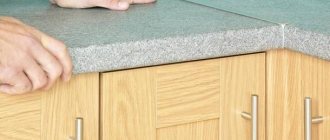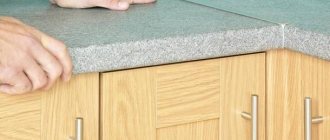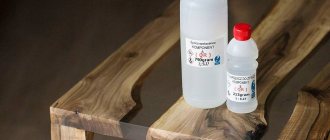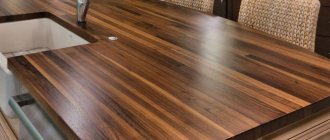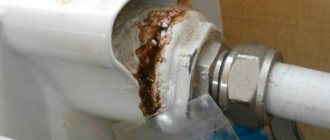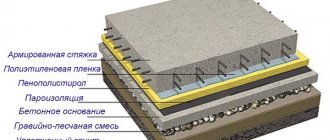Construction and household repairs, production of exclusive designer furniture, costume jewelry, aircraft manufacturing and shipbuilding are industries in which epoxy resins are widely used. Quick to prepare, easy to store and use, paintable in all imaginable colors, epoxy has rightfully occupied its niche in many areas of activity.
But there are situations when its use is impossible or undesirable, and what are these moments and what are these materials where epoxy resin needs to be replaced, let’s figure it out.
Features and characteristics of epoxy
This substance exhibits the properties of oligomers, since a hardener is required to work with it. After its addition, the resin obtains the required consistency as a result of polymerization. By changing the ratio of substances, you can achieve the desired characteristics of the product - make it soft, elastic or completely hard.
Epoxy resin for creativity Source avenir-pro.com
To understand how to replace epoxy resin for household or industrial use, it is important to take into account all the properties of this material:
- To impart strength, a hardener is required, its amount determines the consistency of the product;
- Epoxy has a long service life; it does not lose its original properties for a long time;
- The substance is resistant to many aggressive components such as alkalis, acids and halogens;
- Does not allow moisture to pass through and does not deteriorate from interaction with liquids;
- Does not emit harmful substances or odors;
- Has a high-quality adhesive seam on the surface;
- Characterized by low shrinkage during polymerization;
- The resin is soluble in acetone and ethereal substances.
Polyesters
Substitutes for epoxy resins - polyester resins - have such an important quality that fundamentally distinguishes it from the first ones, such as constant, unstoppable polymerization, which begins from the very first day of its release by the manufacturer, that is, it slowly but surely thickens until it turns into the monolith, even without the introduction of appropriate additives.
This difference is based on the methods of production of these materials. If in epoxies the basic oligomer base is neutral in its hardening properties and can be stored without changes for a very long time (sometimes over a decade), then in polyesters, manufacturers introduce components in the form of accelerators in advance, which start the polymerization process immediately, making the polyester resin pre-accelerated.
Useful to know > How can you dilute epoxy resin to a liquid state?
Additionally, catalyst-hardening agents are also needed. The latter, however, are introduced into polyesters before direct use. Why not right away, because the range of substances used for rapid hardening of polyester resins, like epoxies, is very limited, and mainly cobalt oil is an accelerator that starts the process of slow polymerization, that is, pre-acceleration. This process has been going on since the day of release and cannot be stopped, but if you focus only on it, years will pass before polyester turns into a monolith.
The seed substance is necessary to release heat when a second substance is combined with it - a catalyst or hardener, which is methyl ethyl ketone peroxide, or PMEC for short. In its pure form, this substance is flammable and explosive, and in order to reduce the risk of extreme situations, a mixture of hydrogen peroxide with some inert solvent is introduced into it. But even in this form, PMEC and cobalt oil cannot be mixed; fires and explosions are still possible.
Therefore, petrate is introduced already at the production stage, and methyl ethyl ketone peroxide is introduced immediately before using the polyester resin as an additive, then fires and explosions do not occur, only heat can be released (the mixture can spontaneously heat up to 40-50 ° C degrees).
The heating of the mixture caused by PMEC, along with the purely chemical triggering of the formation of short polymer chains, causes the substance to first take the form of a thick jelly and then a solid monolith. Complete polymerization to a solid state occurs from 3 to 24 hours, that is, in this respect, polyester resins are similar to epoxy resins.
Due to these properties, polyester resins have a short shelf life. Typically, from the date of release, the manufacturer gives a six-month period during which the resin does not lose its original properties. When stored in the cold, but not at temperatures below zero, this period is extended by 2-3 times.
About 25-30 years ago, polyester resins were produced without an accelerator, that is, they were not accelerated at all. Yes, this made it possible to increase the shelf life of polyester compositions (paints, varnishes, mastics) to 3-4 years or more. But the need to mix the accelerator and the catalyst-hardener by the buyers themselves, and the incorrectness of their actions when mixing, often led to accidents, fires and even explosions, so they refused to release non-accelerated polyesters for sale.
Analogs of material
Given the unique properties of the substance, it is quite difficult to find a replacement for epoxy resin. In their work, craftsmen often use liquid glass or sodium silicate. This product is completely safe for health and does not cause allergies, which is why it has become widespread. The problem is that the product is difficult to apply and takes a long time to polymerize. The use of liquid glass takes place in several stages:
- The surface is covered with a thin layer of the substance;
- Wait for it to dry completely;
- Dry areas are immediately treated with alcohol;
- Apply the next layer and dry it as well.
Since the composition of the product is similar to glass, it is especially good to combine it with the appropriate material. In this case, drying will occur much faster.
Liquid glass for waterproofing Source gidro-exp.ru
Silicate glue
A good replacement for epoxy resin in everyday life is silicate-based adhesives. The product is suitable for working with porcelain, ceramic, cardboard and glass products. This glue can also protect wood and fabric from possible fire. The materials gain additional strength and durability. To improve the characteristics, the following components are added to silicate glue:
- Powdered glass and asbestos. When mixed with silicates, a substance is obtained that is resistant to heat. Also, the product is inert towards alkalis and acids. This mixture is suitable for glass, porcelain and ceramic products.
- If there are acids in the tank, other ingredients are used. Liquid glass, silicates, asbestos, magnesia and fine sand are combined in equal proportions.
- For work in wet areas, a mixture of glue and casein powder is suitable.
Silicate-based sealants will help isolate the room from liquid. The products have good resistance to moisture and can also withstand high temperatures. The result is a very strong and reliable bond.
Silicate adhesive for fixing slabs Source rockwool.com
Two-component acrylic paints
Hardeners with acrylic-based paints and varnishes are a typical representative of two-component materials.
They are a “set” of component A - the base, component B - the hardener. They are available in two different containers. This is due to the fact that these substances cannot be stored together. If they are placed in the same container, an irreversible reaction will immediately begin. The base is a high molecular weight compound.
It is a product of the polymerization of acids such as methacrylic and acrylic. Along with them, component A contains esters, for example, butyl acrylate, methyl methacrylate and others.
Thus, a copolymer containing units with hydroxyl OH groups is obtained. There are two types of two-component acrylic materials. Most are adjusted to the desired viscosity after mixing with the hardener using a thinner. There are exceptions. They concern super-filled VHS or UHS compositions. They can also be used without thinner. Everything depends solely on what degree of viscosity is acceptable for carrying out certain work.
Video description
Epoxy resin and epoxy glue.
Cyanoacrylate glue
This is a good analogue of epoxy, including all the variety of superglues. Their distinctive feature is the strength of the resulting film, as well as resistance to moisture and high temperatures. Such properties are provided by special additives contained in the substance. Despite the large number of advantages, cyanoacrylates have certain disadvantages:
- Surface fragility;
- Susceptibility to mechanical damage;
- Short shelf life;
- Incompatibility with fluoroplastic and polyethylene;
- The presence of harmful substances and the danger of interaction with exposed skin.
Containers with cyanoacrylate glue Source stroy-podskazka.ru
Polyester compounds
A noticeable advantage of such substances is the possibility of instant polymerization, which significantly speeds up the work process. In the production of polyesters, special hardeners are immediately added to them so that the products become durable as quickly as possible. Such mixtures are also called pre-accelerated.
Polyester resin Source chamaeleon-produktion.de
Cyanoacrylate adhesives
Adhesive products of this type are a worthy replacement for epoxy. This includes all superglues (“Second”, “Super Moment”, etc.) The substances become completely transparent when dry, and their strength after hardening is comparable to the strength of screws. Some samples contain additional amplifiers and are characterized by heat and water resistance, thermal conductivity, solvent resistance and other useful properties.
But cyanoacrylate products have their drawbacks:
- fragility, low resistance to mechanical stress;
- instability during long-term storage;
- danger to human skin through direct contact.
The choice of a particular cyanoacrylate adhesive depends on the surface to be attached. Such substances are most applicable for metal-plastic and glass. Not suitable for gluing polyethylene and fluoroplastic. Products come in different degrees of viscosity: low and high.
In the first case, high-strength adhesive seams are obtained, provided that the surfaces are well joined. Compositions with a high degree of viscosity allow you to achieve the most durable connections. In particular, such adhesives are used for adhesion of PVC boat fabric.
Video description
Replacement of epoxy and UV resins.
Titanium
The substance has a wide range of applications - it can be used when working with wood, polyurethane, fabric, paper, plasterboard and concrete surfaces. The product is colorless and odorless, absolutely transparent. Mode of application:
- Apply to a clean, pre-prepared area;
- Wait until drying begins, and then connect the working surfaces to each other;
- If the material is porous, an additional layer may be required, which should be applied after 15 minutes;
- Wait until the product is completely dry before starting to use it.
The main advantage of this glue is its long-term strength, thanks to which the material can be used for many months and even years. The substance retains elasticity and is not subject to fragility.
Titanium glue in a container Source rulon.shop
What solvent can I use?
Any weak solvent will be suitable for use in epoxy mortar. Adding too much solvent can have a disastrous effect on the final adhesive solution, so don't waste your money on these types of solvents. A regular varnish solvent is best; it will have the least effect on the quality of the glue and will not change its color at all. If this type of solvent is unavailable, it is not necessary to go to the store to buy it; it can be replaced with ordinary acetone. In this case, you need to understand that the quality of the resulting adhesive solution will be somewhat worse, and the color of the glue may change quite a lot.
If both types of solvent are not available, a solvent with a percentage of no more than 5% can be used. The use of stronger solvents is permitted solely at your own risk.
Hardener analogues
In order for epoxy to acquire hardness and strength, it needs a special hardener, thanks to which polymerization begins. If this substance is not enough or it was not provided by the resin manufacturer, you can look for an alternative. The following options are best:
- Ammonia;
- Benzoyl peroxide;
- Orthophosphoric acid.
These are good and safe solutions, but they should only be used when absolutely necessary. The fact is that special hardeners have certain properties that are very difficult to replace with analogues. The results of such work may be unpredictable. Therefore, you need to use every opportunity to purchase a quality product.
Containers with hardeners Source kraski-net.ru
Gel polishes
In home creativity and when solving many everyday issues, you can use the simplest gel varnishes. They, like epoxy glue, have similar properties. Transparent gel polishes are considered the best; they can replace epoxy resin in texture. After giving the glue the desired shape, it is recommended to place the mold under ultraviolet rays (lamp) to speed up the natural polymerization process. There is no need to use construction compounds thinking that they can replace epoxy glue. All of them take a long time to dry and even after hardening have a sticky surface.
Share on social media networks
Why should you look for an alternative to epoxy resin?
Substance analogues may be needed in some special situations:
- People with a history of allergic reactions are not recommended to use such products, as there is a possibility of developing the disease;
- The product has a complex shape that is difficult to process with epoxy resin;
- High environmental friendliness is required, for example, when interacting with dishes or baby supplies;
- The desire to save money or the inability to spend a large amount of money (prices for epoxy may be unacceptable in some cases);
- The product is out of stock and cannot be purchased at nearby retail outlets.
Areas of application
Epoxy resin for creative work is a unique material that leaves incredible scope for handicrafts. With its help, artistic products and objects that have practical applications are created. Some areas of application of the material deserve special attention.
Decorations
Transparent resin is ideal for creating original handmade products. Modern craftsmen create original pendants, pendants, brooches and rings, earrings and bracelets made of epoxy resin. Products in which parts of living nature are carefully preserved look especially elegant.
Decor elements
An unusual paperweight for papers, a stylish candlestick, just a piece of furniture, different in shape and color from any existing thing. Using epoxy resin, you can create designer masterpieces that will amaze your imagination. Their fragile beauty looks very unusual and attracts the eye. Flower vases created by masters can recreate the splash of sea foam or convey the fragility of frost on frosty glass.
Lamps
Due to its dielectric properties, epoxy resin often becomes the basis for creating original lamps. The shape of the product can be any, as well as the decorative design. You can create a unique piece of furniture for a specific design project of a house or apartment.
Furniture
The use of epoxy resin to make furniture does not look too avant-garde, you just have to see the result of such work. Most often, the tabletop is made of transparent material. When poured, you can place almost any decor in it - from dried flowers and greenery to sea pebbles. The combination of wood and epoxy resin looks very interesting, the furniture is durable and original. In addition to countertops, this material makes beautiful and durable window sills and unusual aprons for the kitchen.
Dishes
Epoxy resin cannot seriously replace glass or ceramics in the manufacture of tableware. But it makes interesting decorative items: vases for fruits and sweets, coasters, napkin holders, serving items. Tinted epoxy resin works well with wood and wicker frames.
Three replacement factors
It is impossible to find a complete replacement for epoxy resin.
You have to sacrifice durability, which is unbeatable here, or durability. For example, a material such as polyester resin is not much inferior to epoxy resin; it is a worthy analogue. The most common example of replacement is in everyday life, during home repairs or design and construction work. Moreover, these two areas closely overlap. The most common example of this type of replacement provided is for grouted floors. Externally, immediately after the job is completed, the two types of these coatings, epoxy and polyester, are usually indistinguishable, the difference will be reflected later as the external gloss and wear scratches (epoxy will be even stronger than its alternative). Typically, such a replacement is dictated by three circumstances:
- Allergy to epoxy resin or hardeners. In these cases, protective measures such as self-contained respirators, warm clothing, safety glasses and gloves are primarily used. So they try to change the brand of resin or hardener, or both, and if all else fails, they look for an alternative.
- The need to restore broken or broken into large fragments of utensils that are used for cooking or eating - epoxy resin in this regard, although moderately toxic, is slightly toxic.
- Cost of epoxy resin. For large works, its purchase results in a decent amount. Sometimes you can find inexpensive trains with similar functionality. Even though it is inexpensive, it is a relative term.
Cyanoacrylate
Continuing the topic of replacing epoxy resin, you can consider an adhesive option such as CYANACRYLATE.
Its composition is almost identical to the composition of epoxy resin, and the manufacturers have quite popular brands (Moment, Titan and others).
Advantages include strong adhesion, transparency, durability, resistance to water and extreme temperatures.
Of the minuses: the glue is subject to mechanical damage, it is a strong allergic compound, not suitable for polyethylene, short-lived.
